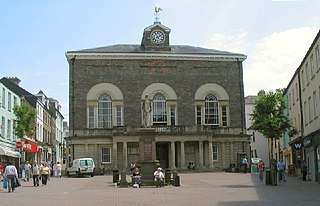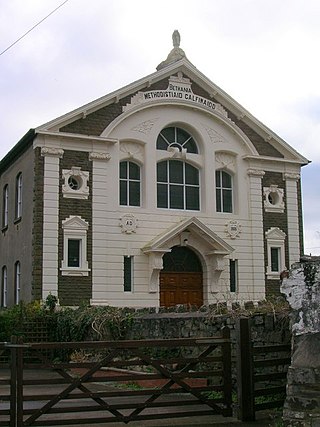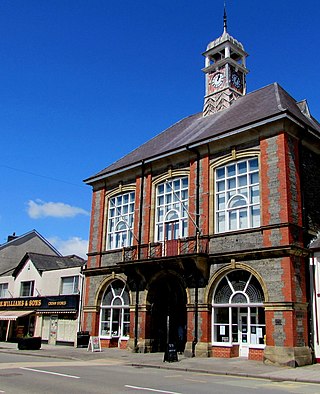
Carmarthenshire is a county in the south-west of Wales. The three largest towns are Llanelli, Carmarthen and Ammanford. Carmarthen is the county town and administrative centre. The county is known as the "Garden of Wales" and is also home to the National Botanic Garden of Wales.

Ammanford is a town and community in Carmarthenshire, Wales, with a population of 5,411 at the 2011 census. It is a former coal mining town. The built-up area had a population of 7,945.

Glanamman is a mining village in the valley of the River Amman in Carmarthenshire, Wales. Glanamman has long been a stronghold of the Welsh language; village life is largely conducted in Welsh. Like the neighbouring village of Garnant it experienced a coal-mining boom in the 19th and early 20th centuries, but the last big colliery closed in 1947 and coal has been extracted fitfully since then.
Brynamman is a village on the south side of the Black Mountain, part of the Brecon Beacons National Park. The village is split into Upper Brynamman and Lower Brynamman by the River Amman, which is also the boundary between the counties of Carmarthenshire and Neath Port Talbot. Ruins of stone dwellings, an early type of lime kiln and rectangular medieval buildings found on the mountain show that people have lived in this area for a long time. The population of Brynamman was 2,608 as of 2011; the urban area including Gwaun-Cae-Gurwen was 5,692.

Cwmamman is a community in Carmarthenshire, about 12 miles north of Swansea in southwest Wales. Literally meaning "Amman valley", it takes its name from the River Amman which runs through the area.

Dinefwr was one of six local government districts of the county of Dyfed, Wales from 1974 to 1996. It was named after Dinefwr Castle which in the Middle Ages had been the court of the House of Dinefwr and one of the three principal royal courts of Wales with Aberffraw and Shrewsbury.

Garnant is a mining village in the valley of the River Amman in Carmarthenshire, Wales, north of Swansea. Like the neighbouring village of Glanamman it experienced a coal-mining boom in the 19th and early 20th centuries, but the last big colliery closed in 1936 and coal has been extracted fitfully since then. The village has the only Commissioners' church built in southwest Wales, traditionally a Methodist region.

Carmarthenshire County Council is the local authority for the county of Carmarthenshire, Wales. It provides a range of services including education, planning, transport, social services and public safety. The council is one of twenty-two unitary authorities that came into existence on 1 April 1996 under the provisions of the Local Government (Wales) Act 1994. It took over local government functions previously provided by the three district councils of Carmarthen, Dinefwr, and Llanelli, as well as the county-level services in the area from Dyfed County Council, all of which councils were abolished at the same time.

Caerfyrddin, also known as Carmarthen, is a constituency of the House of Commons in the UK Parliament, first contested at the 2024 United Kingdom general election, following the 2023 Periodic Review of Westminster constituencies.
Ammanford is an electoral ward to Carmarthenshire County Council, representing the community of Ammanford, Carmarthenshire, Wales.
Llandeilo Rural District Council was a local authority in east Carmarthenshire, Wales created in 1894. The first election to the authority was held in December 1894.

Llanelli Town Hall is a municipal building in Church Street, Llanelli, Carmarthenshire, South Wales. The town hall, which was the headquarters of Llanelli Borough Council, is a Grade II listed building.

Aberystwyth Town Hall is a municipal structure in Queen's Square, Aberystwyth, Wales. The structure, which was the headquarters of Aberystwyth Borough Council, has operated since 2012 as a public library and a pensioners' day centre.

Lampeter Town Hall is a municipal structure in the High Street, Lampeter, Wales. The town hall, which was the meeting place of Lampeter Borough Council, is a Grade II listed building.

Llandovery Town Hall is a municipal building in Market Street, Llandovery in Carmarthenshire, Wales. The structure, which is used as the local public library, is a Grade II listed building.

County Hall, formerly Aberaeron Town Hall, is a municipal building in Market Street, Aberaeron, Ceredigion, Wales. The structure, which is now used as a public library, is a Grade II listed building.
Pontamman was the name of an electoral ward for Carmarthenshire County Council, which included parts of the town and community of Ammanford, Carmarthenshire, Wales. It was represented by one county councillor.

Alban Square, in the centre of Aberaeron, Ceredigion, Wales is a range of early 19th century townhouses. The town of Aberaeron was developed around 1810 as a port by the Rev. Alban Thomas Jones Gwynne, a local landowner. After his father's death in 1819, Colonel A.T.J. Gwynne engaged Edward Haycock Sr. to plan a major expansion. Leases were sold in the early 1830s and Alban Square was designed, but largely unbuilt, by 1834. The town grew as a centre for shipbuilding and commerce. The expansion of the railways, and their arrival in Aberaeron in 1909 brought these commercial endeavours to an end and the town became a seaside resort and a centre for local government. No.s 9-20 inclusive on Alban Square are Grade II* listed buildings, their Cadw listing records describing the square as "a well preserved terrace in a key location".

Portland Place, in the centre of Aberaeron, Ceredigion, Wales is a terrace of mid-19th century townhouses. The town of Aberaeron was developed around 1810 as a port by the Rev. Alban Thomas Jones Gwynne, a local landowner. After his father's death in 1819, Colonel A.T.J. Gwynne engaged Edward Haycock Sr. to plan a major expansion. Leases were sold in the early 1830s and development continued for much of the rest of the 19th century, the town growing as a centre for shipbuilding and commerce. The expansion of the railways, and their arrival in Aberaeron in 1909 brought these commercial endeavours to an end and the town became a seaside resort and a centre for local government. No.s 1-7 inclusive on Portland Place are Grade II* listed buildings, forming "the finest single terrace" in Aberaeron.

The Shire Hall is a municipal building in Carmarthen Street, Llandeilo, Carmarthenshire, Wales. The structure, which was used as a courthouse for over a century, is now the meeting place of Llandeilo Town Council.

















